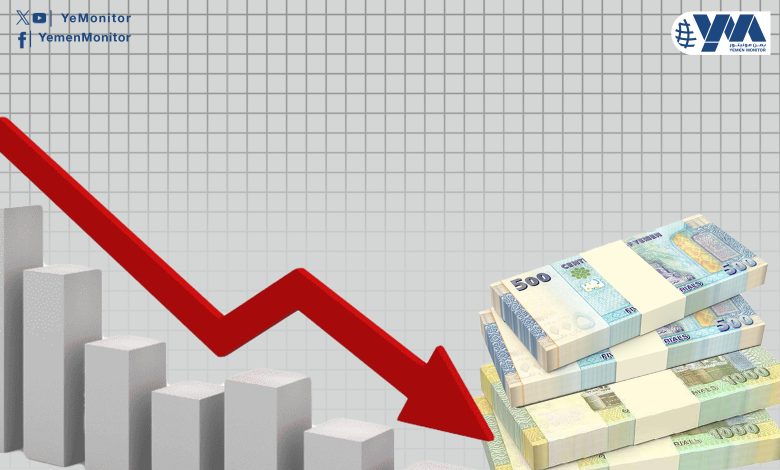
Yemen monitor / reporting unit / private
Yemeni Riyal is in continuous decline against other currencies since the beginning of this year, and its value fell to its lowest level since December 2021, after exceeding the barrier of 1600 against the dollar. Meanwhile, the shipping costs to Yemen continue rising, which threatens the situation in the country.
This comes at a time when Yemen has entered a new stage, after the escalation of Houthi militias in the Red Sea and the Gulf of Aden against commercial ships following the recent Gaza events, the decline in the progress of the peace file in the country, which was supported by the United Nations, the American reclassification of the group as a terrorist organization, that led Yemenis to lose hope of reaching a solution to the current crisis.
In addition to the continuation of political divisions in Yemen, the collapse of the country’s revenues from oil exports due to Houthi militia attacks on ports, as well as Customs and tax, and the dependence of the legitimate government on a donation from the kingdom of Saudi Arabia, allocated to pay employees ‘ salaries since August 2023, according to economists.
Expensive living
As the value of the Yemeni riyal continues to fluctuate, the pressure on citizens has increased, who have become unable to provide their basic requirements, as the salaries of most employees in the government sector have not increased to be in line with the current expensive living situation.
The rise of the food prices which varied from place to place, according to a survey by “Yemen Monitor” reporter, who asked traders about the percentage of the increase; they confirmed that they are deliberately depend on exchange rates.
According to UN reports, 17 million Yemenis are food insecure. Families are suffering from severe acute malnutrition, and an increase in mortality, due to the fact that one in five families is suffering from a severe food consumption disorder.
Consequences of the attack on ships With the multiple causes of the recent wave of high prices witnessed by various markets, Wafiq Saleh a journalist specialized in economic affairs , said that it was due to the collapse of the value of the Yemeni riyal, in addition to the rise in insurance premiums for the transportation of goods by ships in the Red Sea, and the high costs of transportation by sea.
All this led to the disruption of commodity prices and it’s rise in local markets, the rise of inflation that affected various prices of goods and services, as he explained to”Yemen monitor”.
Saleh continued:”the recent attacks in the Red Sea exacerbate the problem of the Yemeni economy, and have many repercussions in various sectors, the most important of which is import, as Yemen is a country that depends 90% of its food needs on import.
He added: Any disruption in supply chains, the process of navigational movement, will lead to disruption of the flow of goods, financing bottlenecks, the disappearance of some goods and, consequently, a significant rise in commodity prices in the domestic market.
He explained that the cost of insurance on goods represents 50% of the value of the commodity in the local market, such as flour, so it’s continuous rise will lead to higher prices in general, and the deterioration of the living situation.
Expectation
With the blurring of the political scene and the horizon of the economy in Yemen, especially with the continuation of the monetary division between Sana’a and Aden, and the speculation of the currency by the exchange companies to control its price, researcher on Economic Affairs Abdul Wahid Al-obali expects that the Yemeni riyal will continue it’s decline during the coming period due to the continued factors of economic weakness, political instability as a result of the continuation of the Houthi coup companied the increase in looting and illegal levies. Also the continued corruption and subservience of the legitimate leadership with this coup, as he said.
Al-obali to, ”Yemen monitor”, believes that all this will increase the risk of inflation, rising prices of goods and imports. He pointed out that the government is still unable to provide sufficient foreign currency to support the riyal.
Solutions to the crisis
One of the most important solutions that the researcher Al-obali believes is important to stop the decline in the value of the riyal is to immediately work to end the coup and re-achieve peace and political stability, at the same time, also the Aden refineries, and other refineries in Hadramaut and Shabwa should be restarted to cover local consumption.
according to Al-obali, It is also necessary to restart the ports of legitimacy and enable them to import food and goods, as well as reactivate the banking sector, transfer all amounts of humanitarian aid through the central bank of Yemen in Aden. In the other hand, force all the government institutions and ministries to deal exclusively with the central bank, and stop dealing with exchange companies and the black markets.
Yemen has been suffering from a continuous economic deterioration since the start of the war. The government is seeking to take measures to reduce this deterioration, including what it has recently done, such as combating smuggling and reducing customs evasion.




